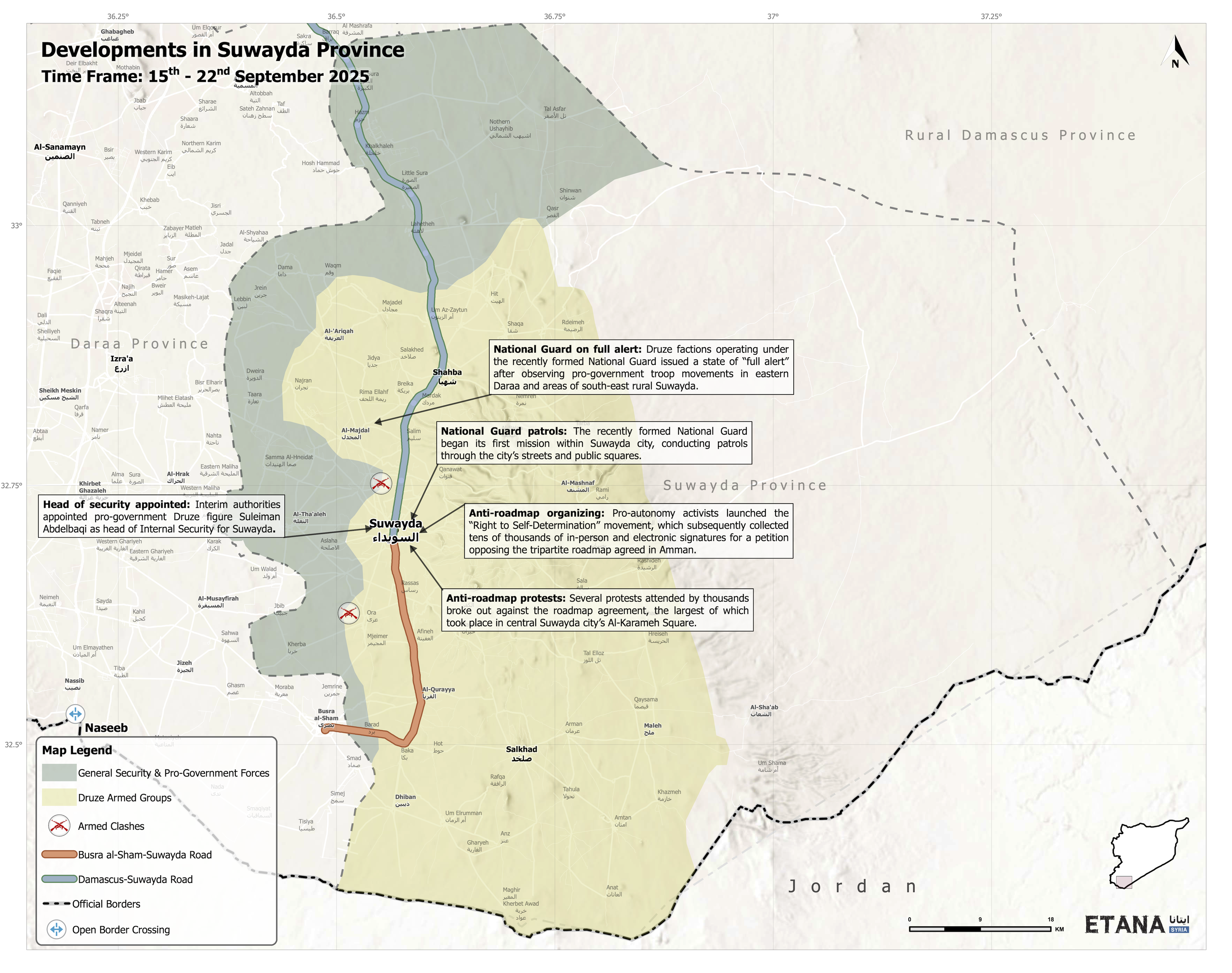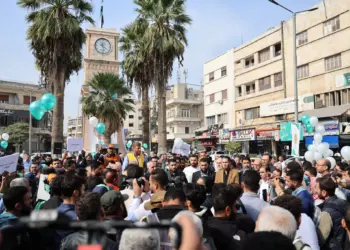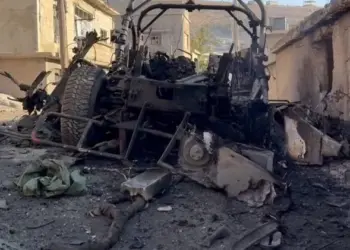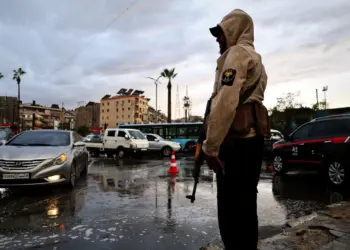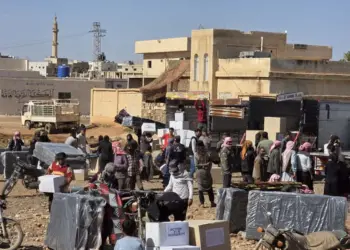Building on the ceasefire brokered between Syria, Jordan and the US in late July, the three countries last week announced a “roadmap” designed to end the stand-off in south Syria. While more expansive than past tripartite documents (as it emphasizes the importance of reconciliation, rights and accountability in any settlement), discussions around the roadmap failed to consult Druze community leaders in Suwayda—as such, the roadmap is being seen as an imposition foisted on Suwayda by Damascus and/or outside powers. One of the major sticking-points appears to be the roadmap’s emphasis on accountability for abuses in Suwayda, with prominent voices in Suwayda rejecting the premise that the interim administration—one of the actioning parties of the roadmap—be in any way involved in investigating abuses that it is accused of perpetrating. The Druze new emphasis on the need for international accountability investigations indicates what little trust they have in the interim administration—trust that is needed if international powers want to secure a sustainable settlement to the crisis in Suwayda.
Roadmap Agreement Announced
Last week, Syrian Foreign Minister Asa’ad al-Shibani announced adoption of a tripartite roadmap meant to resolve the stand-off in Suwayda following a meeting in Amman with Jordanian Foreign Minister Ayman al-Safadi and US special envoy Tom Barrack. Al-Shibani said the meeting would “guarantee rights, uphold justice, strengthen social reconciliation and pave the way toward healing wounds,” according to state-run agency SANA. As per the roadmap, the UN Commission of Inquiry will be invited by Damascus to investigate the mass killings in Suwayda, while interim authorities will permit the flow of humanitarian and medical goods to the province. Overall, though, there is little radically new in the roadmap compared with statements following past tripartite meetings vis-à-vis Suwayda. It does, however, call for Interior Ministry security forces to protect roadways and civilian and commercial movements and envisages a reconciliation process engaging all communities in Suwayda.
Within Suwayda itself, there has been significant public backlash against the roadmap announcement. There is notable rankling against the way in which the roadmap was discussed and formalized. For one, it was guided by the views of Lebanese Druze figure Walid Jumblatt, who does not have legitimacy to represent Suwayda’s Druze community; by contrast, community leaders and Syrians from Suwayda were not consulted. As such, the roadmap is being seen as a reflection of the top-down approach towards Suwayda taken by both the interim administration and regional powers backing it, which is only strengthening calls for Druze self-determination—something that used to be a relatively minority-held demand within Suwayda prior to recent violence. Consequently, Druze activists and ordinary residents took to the streets to register their opposition to the roadmap in the days after its announcement; the largest of these protests took place in central Suwayda city’s Al-Karameh Square.. Controversially, US and Israeli flags were raised by some protesters at the Al-Karameh Square demo—moves that at previous demonstrations have resulted in public backlash against the Druze community in Suwayda from other Syrians.
Perhaps more significantly, though, activists have tactically sought ways to effectively represent opposition to the roadmap—in contrast to the allegedly unrepresentative way in which the roadmap itself was conducted—by collecting up to 100,000 signatures either in-person or online for a petition in favor of self-determination in Suwayda. Pro-autonomy activists launched the “Right to Self-Determination” petition initiative on the same day that the roadmap was announced, opening centers for collecting signatures across the province and publishing an electronic version of the petition online. The online campaign closed hours after reaching over 100,000 signatures, while the collection of in-person signatures was ongoing at the time of writing.
The roadmap is also facing resistance at higher levels. Suwayda’s Supreme Legal Committee, an independent body representing the province politically, administratively and security-wise, issued its own statement decrying the roadmap. The statement, amongst other things, opposed any arrangements imposed by force (or coercion) on the people of Suwayda; affirmed Suwayda’s right to “freedom and self-determination”; and criticized the roadmap’s emphasis on accountability when one of the actioning states party to the roadmap (Syria) was the perpetrator of abuses in July now supposedly up for investigation. Senior Druze cleric Sheikh Hikmat al-Hijri, meanwhile, did not comment on the roadmap, but on Thursday his office issued a short statement in response to allegedly fabricated statements attributed to him published by Saudi outlet Al-Arabiya TV. In that statement, al-Hijri rejected the contents of the roadmap document and emphasized that the “right to self-determination and independence is a common popular demand of all members of the Druze community in Suwayda.” Al-Hijri subsequently issued a letter to expat signatories of the self-determination petition, framing Suwayda’s “just struggle…for our right to self-determination” as a bulwark against the “threat of exclusion and genocide.”
Military & Security Developments
The ceasefire remains in place, though there have been multiple scattered reports of ceasefire violations since ETANA’s last reporting on Suwayda. These they should not be seen as significant escalations as yet—rather, they still represent tit-for-tat exchanges typical of the kind of tense stand-off seen in Suwayda. For now, there are few signs that political opposition is transforming into military or security instability.
Meanwhile, Druze factions are organizing their own defense. Formed in late August as an attempted united front against external threats and coalescing around Sheikh al-Hijri’s political project, the “National Guard” (Al-Haris al-Watani) umbrella of anti-government Druze factions started on-the-ground operations in the past week. Having undergone restructuring (with factions integrated into the National Guard with proper brigade, battalion and company structures), the National Guard began its first mission within Suwayda city, conducting patrols through the city’s streets and public squares. The National Guard will have to contend with Suleiman Abdelbaqi, whom interim authorities recently appointed as head of Internal Security in Suwayda. Abdelbaqi has been a supporter of the interim administration’s objectives in Suwayda and a long-time opponent of Sheikh al-Hijri.
